名词性从句
名词性从句讲解(最全版)
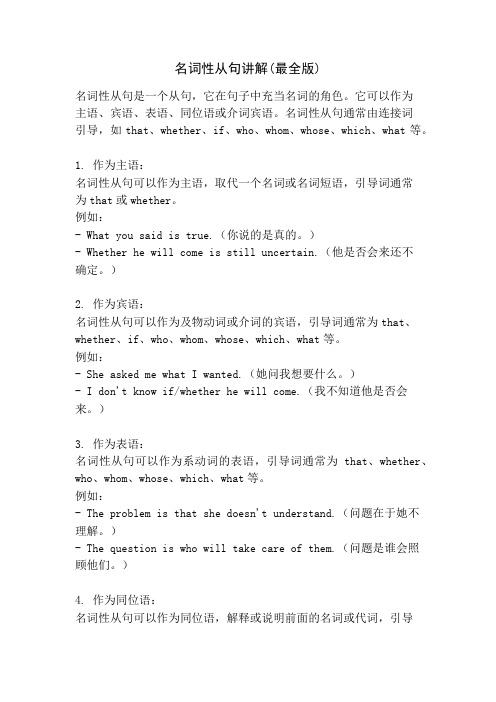
名词性从句讲解(最全版)名词性从句是一个从句,它在句子中充当名词的角色。
它可以作为主语、宾语、表语、同位语或介词宾语。
名词性从句通常由连接词引导,如that、whether、if、who、whom、whose、which、what等。
1. 作为主语:名词性从句可以作为主语,取代一个名词或名词短语,引导词通常为that或whether。
例如:- What you said is true.(你说的是真的。
)- Whether he will come is still uncertain.(他是否会来还不确定。
)2. 作为宾语:名词性从句可以作为及物动词或介词的宾语,引导词通常为that、whether、if、who、whom、whose、which、what等。
例如:- She asked me what I wanted.(她问我想要什么。
)- I don't know if/whether he will come.(我不知道他是否会来。
)3. 作为表语:名词性从句可以作为系动词的表语,引导词通常为that、whether、who、whom、whose、which、what等。
例如:- The problem is that she doesn't understand.(问题在于她不理解。
)- The question is who will take care of them.(问题是谁会照顾他们。
)4. 作为同位语:名词性从句可以作为同位语,解释或说明前面的名词或代词,引导词通常为that、whether、who、whom、whose、which、what等。
例如:- The fact that he lied surprised me.(他撒谎的事实让我感到惊讶。
)- His belief that she will succeed is unwavering.(他坚信她会成功。
名词性从句

语序:陈述语序
在句中充当主语的从句称为主语 从句。英语中主语从句的句型可分 为两大类: 直接将主语从句放在主语位置上; 用it作形式主语,将真正的主语从 句后移,放在其他成分后。
让我们先说说第一类吧!
一、连接词(只起连接作用,在从句中不充当句子成分)
that:无词义。 e.g.: 他赢得比赛一事在我国引起巨大轰动。 That he won the game made a tremendous stir in our country. whether:“是否”。可单独使用,也可与or或or not连用。 e.g.: 我们明天是否能去春游取决于天气。 Whether we can go for a spring outing depends on the weather. 他们是否会来还未告诉我们。 Whether they will come has not been told to us.
四、主语从句与主谓一致
一个从句作主语时,谓语动词通常用单数形式, 特别是用it作形式主语的句型。 e.g.: Whether this kind of chemicals is better has not been tried.
当what引导主从,应遵循意义一致原则,谓语动 词选用相应形式。表语是复数时,谓语动词用复数 形式。 e.g.: What we do willingly is easy. What they were searching for were the missing gems.
Introduction
名词性从句:包括四种:主语从句、表语从句、宾语从
句、同位语从句。
连词:引导名词性从句的连词有以下三类
连接词:只起连接作用,在从句中不充当句子成分; 连接代词:连接主从句,并在从句中作主语/宾语/表 语/定语; 连接副词:连接主从句,并在从句中作时状/地状/原 因状/方式状。
名词性从句的种类与作用

名词性从句的种类与作用名词性从句是指在句子中充当名词的句子成分,它能够承担名词所具有的各种功能,如主语、宾语、表语、同位语等。
名词性从句的使用可以使句子更加丰富,表达更加准确。
本文将介绍名词性从句的种类及其作用。
一、主语从句主语从句是名词性从句的一种常见形式,它在句子中充当主语的角色,起到句子的主题和核心的作用。
主语从句通常以“that”或“whether”引导。
例如:1. That he is a talented musician is well known to everyone.2. Whether she will come to the party is still uncertain.主语从句常常用于强调句和形式主语的表达中,使句子更加生动有力。
二、宾语从句宾语从句作为动词的宾语出现,可以回答“what”、“where”、“which”、“who”等疑问词引导的问题。
它常见于及物动词后,也可用于介词后。
例如:1. She asked me what I wanted for dinner.2. He told me where he had been yesterday.宾语从句的作用是充当动词的宾语,使句子更加完整,表达更加准确。
三、表语从句表语从句用来修饰名词或代词,充当表语的角色,常以“that”或“whether”引导。
表语从句通常出现在“be”动词后或感官动词后。
例如:1. The question is whether we should go or stay.2. His wish is that he could travel around the world.表语从句可以在句中起到进一步解释、说明或补充的作用,使句子更加丰富多样。
四、同位语从句同位语从句指的是对名词或代词进行解释、说明或补充的句子,常见于名词后面,起到进一步解释名词的作用。
同位语从句通常以“that”引导。
名词性从句
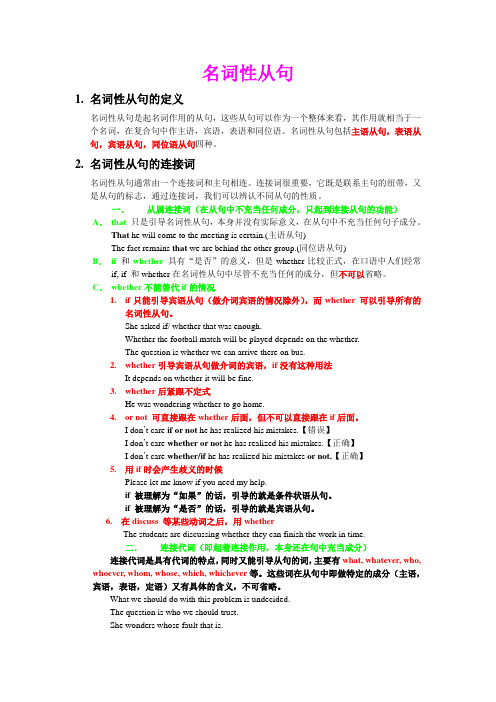
名词性从句1.名词性从句的定义名词性从句是起名词作用的从句,这些从句可以作为一个整体来看,其作用就相当于一个名词,在复合句中作主语,宾语,表语和同位语。
名词性从句包括主语从句,表语从句,宾语从句,同位语从句四种。
2.名词性从句的连接词名词性从句通常由一个连接词和主句相连。
连接词很重要,它既是联系主句的纽带,又是从句的标志,通过连接词,我们可以辨认不同从句的性质。
一.从属连接词(在从句中不充当任何成分,只起到连接从句的功能)A.that 只是引导名词性从句,本身并没有实际意义,在从句中不充当任何句子成分。
That he will come to the meeting is certain.(主语从句)The fact remains that we are behind the other group.(同位语从句)B.if和whether具有“是否”的意义,但是whether比较正式,在口语中人们经常if, if 和whether在名词性从句中尽管不充当任何的成分,但不可以省略。
C.whether不能替代if的情况1.if只能引导宾语从句(做介词宾语的情况除外),而whether 可以引导所有的名词性从句。
She asked if/ whether that was enough.Whether the football match will be played depends on the whether.The question is whether we can arrive there on bus.2.whether引导宾语从句做介词的宾语,if没有这种用法It depends on whether it will be fine.3.whether后紧跟不定式He was wondering whether to go home.4.or not 可直接跟在whether后面,但不可以直接跟在if后面。
名词性从句

作状语
1.Study the underlined noun clauses in these sentences. In your opinion ,what roles do these clauses play in the sentences
What attracts people to California is its pleasant climate
to do
f. whether 后紧跟or not 引 导宾语从句时不用if.
本节课语法项目总结: 一、名词性从句的语序——陈述语序 二、名词性从句连接词的选用
• Homework
1. 整理语法笔记
2.独立或者小组讨论完成课本第5页的第4 小 题。
3.认真思考一下同位语与定语从句之间的区 别?
携手共进,齐创精品工程
7.The doctor can hardly answer the question
___C___ the old man will recover soon. 8. I don’t know ____C___ to go.
只用whether不用if 的情况: a. 主语从句中 b. 表语从句中 c. 同位语从句中 d. 介词后的宾语从句中 e. Whether后直接跟不定式
F 1.She pretended D 2.It is not surprising A/E 3.Why she didn't tell you herself C 4.I wonder G 5.The trouble was B 6.It is essential
A.Is what I want to know. B.that you get a visa befow you travel to the
名词性从句的三种类型及例句解析
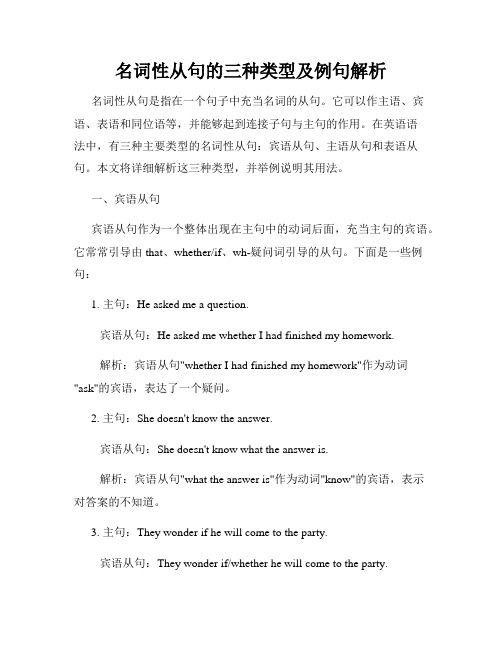
名词性从句的三种类型及例句解析名词性从句是指在一个句子中充当名词的从句。
它可以作主语、宾语、表语和同位语等,并能够起到连接子句与主句的作用。
在英语语法中,有三种主要类型的名词性从句:宾语从句、主语从句和表语从句。
本文将详细解析这三种类型,并举例说明其用法。
一、宾语从句宾语从句作为一个整体出现在主句中的动词后面,充当主句的宾语。
它常常引导由that、whether/if、wh-疑问词引导的从句。
下面是一些例句:1. 主句:He asked me a question.宾语从句:He asked me whether I had finished my homework.解析:宾语从句"whether I had finished my homework"作为动词"ask"的宾语,表达了一个疑问。
2. 主句:She doesn't know the answer.宾语从句:She doesn't know what the answer is.解析:宾语从句"what the answer is"作为动词"know"的宾语,表示对答案的不知道。
3. 主句:They wonder if he will come to the party.宾语从句:They wonder if/whether he will come to the party.解析:宾语从句"if/whether he will come to the party"作为动词"wonder"的宾语,表达了对他是否会来参加派对的疑问。
二、主语从句主语从句作为一个整体出现在句子的最前面,充当主句的主语。
它通常由that引导,也可以由wh-疑问词引导。
以下是一些例句:1. 主句:It is important to learn a foreign language.主语从句:That she is a hardworking student is important.解析:主语从句"That she is a hardworking student"作为句子的主语,强调了她是一个勤奋的学生的重要性。
名词性从句

3) It +不及物动词+从句
It happened that...
碰巧……
It occurred to me that…我突然想起…
*_I_t _h_a_p_p_en_e_d__th_a_t___(刚好)I came into the office at that time.
*_It_o_c_c_u_r_re_d__to__m_e_t_h_a_t ___(我突然想起)I forget to sent the letter.
3. 作形容词或过去分词的宾语,例如:
I am afraid (that) I’ve made a mistake.
I am sure (that) he will win the game.
She was surprised/pleased that he had passed the exam.
The fact is that we have lost the game.
表语从句
The news that we won the game is exciting.
同位语从句
引导名词性从句的连接词可分为三类: 连接词: that, whether, if 连接代词: what, whatever, who, whoever, whomever,which ,whichever,whose. 连接副词: when, where, how, why
什么是名词性从句
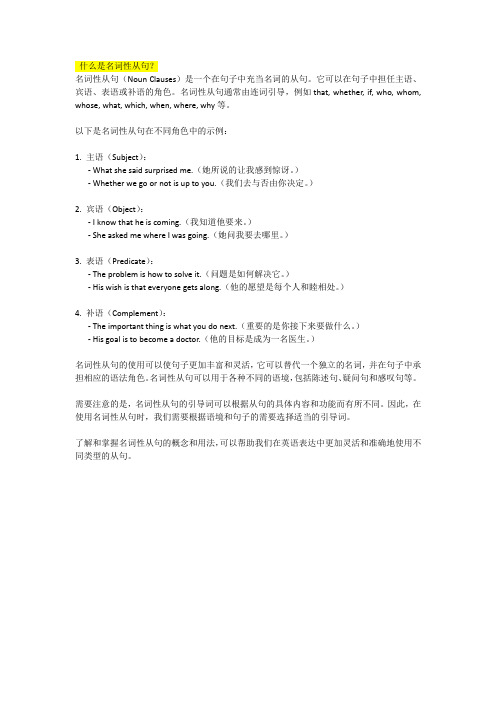
什么是名词性从句?名词性从句(Noun Clauses)是一个在句子中充当名词的从句。
它可以在句子中担任主语、宾语、表语或补语的角色。
名词性从句通常由连词引导,例如that, whether, if, who, whom, whose, what, which, when, where, why等。
以下是名词性从句在不同角色中的示例:1. 主语(Subject):- What she said surprised me.(她所说的让我感到惊讶。
)- Whether we go or not is up to you.(我们去与否由你决定。
)2. 宾语(Object):- I know that he is coming.(我知道他要来。
)- She asked me where I was going.(她问我要去哪里。
)3. 表语(Predicate):- The problem is how to solve it.(问题是如何解决它。
)- His wish is that everyone gets along.(他的愿望是每个人和睦相处。
)4. 补语(Complement):- The important thing is what you do next.(重要的是你接下来要做什么。
)- His goal is to become a doctor.(他的目标是成为一名医生。
)名词性从句的使用可以使句子更加丰富和灵活,它可以替代一个独立的名词,并在句子中承担相应的语法角色。
名词性从句可以用于各种不同的语境,包括陈述句、疑问句和感叹句等。
需要注意的是,名词性从句的引导词可以根据从句的具体内容和功能而有所不同。
因此,在使用名词性从句时,我们需要根据语境和句子的需要选择适当的引导词。
了解和掌握名词性从句的概念和用法,可以帮助我们在英语表达中更加灵活和准确地使用不同类型的从句。
名词性从句有哪些
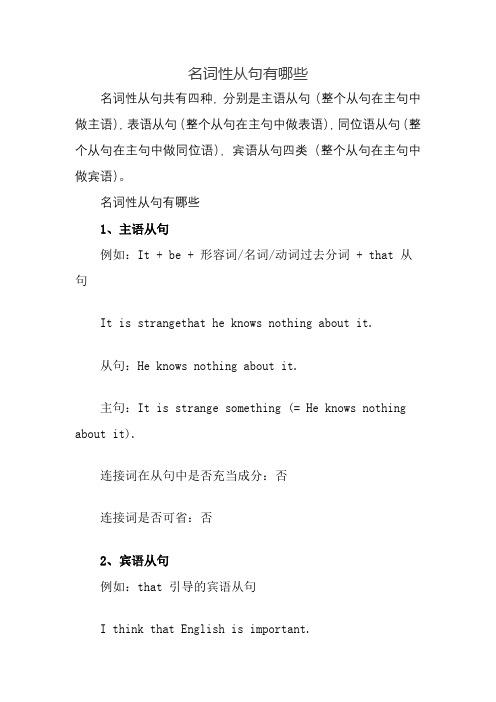
名词性从句有哪些名词性从句共有四种,分别是主语从句(整个从句在主句中做主语),表语从句(整个从句在主句中做表语),同位语从句(整个从句在主句中做同位语),宾语从句四类(整个从句在主句中做宾语)。
名词性从句有哪些1、主语从句例如:It + be + 形容词/名词/动词过去分词 + that 从句It is strangethat he knows nothing about it.从句:He knows nothing about it.主句:It is strange something (= He knows nothing about it).连接词在从句中是否充当成分:否连接词是否可省:否2、宾语从句例如:that 引导的宾语从句I think that English is important.从句:English is important.主句:I think something (= English is important).连接词在从句中是否充当成分:否连接词是否可省:是3、表语从句用法和结构同宾语从句,区别在于:系动词后面所接的从句为表语从句,而及物动词后面所接的从句为宾语从句。
例如:- that 引导的表语从句The truth is that English is important.从句:English is important.主句:The truth is something (= that English is important).4、同位语从句同位语从句就是在复合句中作名词的同位语的名词性从句。
同位语从句对于名词进一步解释,说明名词的具体内容,一般由that引导,同位语从句有时可以不紧跟在它所说明的名词后面,而是被别的词隔开。
名词性从句的用法

名词性从句的用法名词性从句是从句的一种形式,可以在句中担任名词的角色。
在句子中,名词性从句可以充当主语、宾语、表语或补语。
掌握名词性从句的用法,对于提高文章的表达和理解能力非常重要。
本文将详细介绍名词性从句的不同用法及其相关例子。
一、名词性从句作主语1. 名词性从句作主语可以起到引出全文主题的作用。
例子:- What she said is absolutely right.(她说的是完全正确的。
)- Whether we should go camping this weekend remains undecided. (我们是否应该在这个周末去野营还没有决定。
)2. 名词性从句作主语可以代替一个复杂的句子。
例子:- How he managed to finish the project on time is still a mystery.(他如何在时间之内完成这个项目仍然是个谜。
)- What you do in your spare time is your own business.(你在业余时间做什么是你自己的事情。
)二、名词性从句作宾语1. 名词性从句作及物动词的宾语,说明动作的对象。
- I believe that love can change the world.(我相信爱可以改变世界。
)- She doesn't know where she left her keys.(她不知道她把钥匙放在哪里了。
)2. 名词性从句作介词的宾语,说明介词所表示的关系。
例子:- The teacher is proud of what his students have achieved.(老师为他的学生所取得的成绩感到骄傲。
)- I'm interested in how they managed to win the competition.(我对他们是如何赢得这个比赛感兴趣。
名词性从句的三种类型与用法
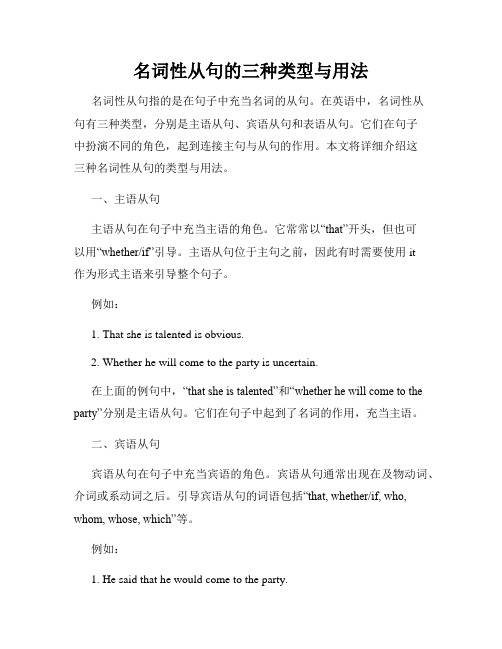
名词性从句的三种类型与用法名词性从句指的是在句子中充当名词的从句。
在英语中,名词性从句有三种类型,分别是主语从句、宾语从句和表语从句。
它们在句子中扮演不同的角色,起到连接主句与从句的作用。
本文将详细介绍这三种名词性从句的类型与用法。
一、主语从句主语从句在句子中充当主语的角色。
它常常以“that”开头,但也可以用“whether/if”引导。
主语从句位于主句之前,因此有时需要使用it作为形式主语来引导整个句子。
例如:1. That she is talented is obvious.2. Whether he will come to the party is uncertain.在上面的例句中,“that she is talented”和“whether he will come to the party”分别是主语从句。
它们在句子中起到了名词的作用,充当主语。
二、宾语从句宾语从句在句子中充当宾语的角色。
宾语从句通常出现在及物动词、介词或系动词之后。
引导宾语从句的词语包括“that, whether/if, who, whom, whose, which”等。
例如:1. He said that he would come to the party.2. I don't know if she has finished her work.在以上例句中,“that he would come to the party”和“if she has finished her work”分别是宾语从句。
它们充当了及物动词“said”和“know”的宾语。
三、表语从句表语从句在句子中充当表语的角色,说明主语的身份、特征、状态或性质。
表语从句通常以“that, whether/if, who, whom, whose, which”等词语引导。
例如:1. My belief is that honesty is the best policy.2. It is unclear whether he can pass the exam.在上述例句中,“that honesty is the best policy”和“whether he can pass the exam”分别是表语从句。
名词性从句的引导词及从属关系

名词性从句的引导词及从属关系名词性从句是英语语法中的一种从句类型,起到名词的作用。
它可以在句中充当主语、宾语、表语或同位语等成分,从而帮助完整表达句子的意思。
名词性从句的引导词是连接主句与从句的关键,不同的引导词所表示的从属关系也会有所不同。
本文将介绍常见的名词性从句引导词及其从属关系。
一、名词性从句的引导词1. that引导的名词性从句that可以引导主语从句、宾语从句、表语从句和同位语从句等。
例如:- 主语从句:That he is innocent is beyond doubt.(他的清白是毋庸置疑的。
)- 宾语从句:She believes that he will come back soon.(她相信他很快就会回来。
)- 表语从句:The fact is that he is always late.(事实是,他总是迟到。
)- 同位语从句:The news that he won the award spread quickly.(他获奖的消息迅速传开。
)2. whether/if引导的名词性从句whether和if都可以引导主语从句、宾语从句和表语从句等。
例如:- 主语从句:Whether he will attend the meeting is still uncertain.(他是否参加会议仍然不确定。
)- 宾语从句:I don't know whether/if she is coming with us.(我不知道她是否和我们一起来。
)- 表语从句:The question is whether/if she is qualified for the job.(问题是,她是否具备这份工作的资格。
)3. who/whom引导的名词性从句who和whom一般用于引导主语从句和宾语从句。
例如:- 主语从句:Who will be in charge of the project remains unknown.(谁将负责这个项目仍然未知。
名词性从句
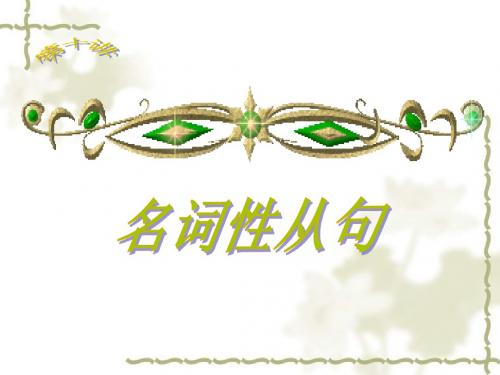
答案:A 参考译文:海龟如何找到返回筑巢区的路,这仍是 一个谜。
3. 名词性关系词引导的主语从句 1)名词性关系代词引导的主语从句
What is most touching in O. Henry’s stories is the bravery with which ordinary people struggle to maintain their dignity . 欧.亨利的小说中最感人的东西是平民为维护尊严而 斗争的勇气。
二、It+be动词+形容词+that从句 It is clear that…显然…… It is possible that…很可能…… It is likely that…很可能…… It is natural that…很自然…… It is certain that…可以相信…… It is strange that…奇怪的是…… It is fortunate that…幸运的是…… It is necessary that…有必要……
As a child —and as an adult as well—Bill Gates was untidy. It has been said that in order to counteract this,Mary drew up weekly clothing plans for him. 译文:童年时期,以及即使长大成人后,比尔.盖茨 也不修边幅。据说为了改掉他的这个毛病,玛丽为 他制定了一周着装计划。
三、It+be动词+名词短语+that从句 It is a pity that…可惜的是…… It is a fact that…事实是…… It is good news that… ……真是太好了。 It is a good thing that… ……真是件好事。 It is no wonder that… 难怪…… It is a shame that…遗憾的是……/……真是太不像话了 It is an honor that…真荣幸…… It is common knowledge that… ……是常识。 It is my belief that … 我相信…… It is a miracle that… ……真是奇迹。
名词性从句

(五)同位语从句 同位语从句在句中作某一名词的同位语, 一般位于该名词(如:news, fact, idea, suggestion, promise等)之后,说明该名词 的具体内容。 e.g. I have no idea when he will be back. The fact that he had not said anything surprised everybody.
3.Wh-ever和 no matter Wh-的区别: Wh-ever:既能引导名词性从句, 又能引导让 步状语从句. no matter Wh-:只能引导让步状语从句. e.g. Whoever breaks the rule shoud be punished. He won’t believe whatever I said. Whatever I said, he won’t believe me. =No matter what I said, he won’t believe me.
注意:连接代词与连接副词在句中不再是疑问句,因而从句中 谓语不用疑问式。连接代词与连接副词在从句充当句子成分, 连接词whether 和if(是否),as if(好象)在从句中不充当句 子成分,只起连接作用。根据句义,如果连接代词与连接副词, whether、if 和as if都用不上时,才用that作连接词(that本身无 任何含义)。
2. that引导的定语从句和同位语从句的区别: that在同位语从句中,不担任成分,只起连接 作用. that在定语从句中,担任成分,可作主语,宾 语和表语 e.g.The news that we heard on the radio is not true. The news that our class won the match was exciting.
名词性从句的语法特点
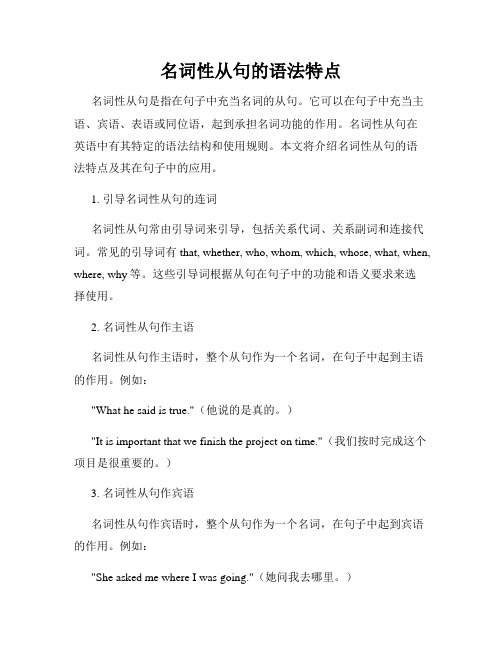
名词性从句的语法特点名词性从句是指在句子中充当名词的从句。
它可以在句子中充当主语、宾语、表语或同位语,起到承担名词功能的作用。
名词性从句在英语中有其特定的语法结构和使用规则。
本文将介绍名词性从句的语法特点及其在句子中的应用。
1. 引导名词性从句的连词名词性从句常由引导词来引导,包括关系代词、关系副词和连接代词。
常见的引导词有that, whether, who, whom, which, whose, what, when, where, why等。
这些引导词根据从句在句子中的功能和语义要求来选择使用。
2. 名词性从句作主语名词性从句作主语时,整个从句作为一个名词,在句子中起到主语的作用。
例如:"What he said is true."(他说的是真的。
)"It is important that we finish the project on time."(我们按时完成这个项目是很重要的。
)3. 名词性从句作宾语名词性从句作宾语时,整个从句作为一个名词,在句子中起到宾语的作用。
例如:"She asked me where I was going."(她问我去哪里。
)"I don't know what he wants."(我不知道他想要什么。
)4. 名词性从句作表语名词性从句作表语时,整个从句作为一个名词,在句子中起到表语的作用。
例如:"The problem is what we should do next."(问题是我们接下来应该做什么。
)5. 名词性从句作同位语名词性从句作同位语时,与主句中的名词构成同位关系,对该名词起补充说明的作用。
例如:"I heard the news that they won the championship."(我听说他们赢得了冠军。
什么是名词性从句
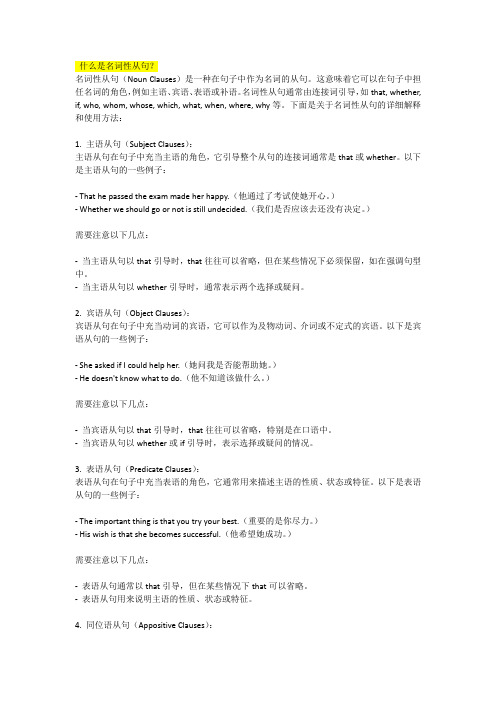
什么是名词性从句?名词性从句(Noun Clauses)是一种在句子中作为名词的从句。
这意味着它可以在句子中担任名词的角色,例如主语、宾语、表语或补语。
名词性从句通常由连接词引导,如that, whether, if, who, whom, whose, which, what, when, where, why等。
下面是关于名词性从句的详细解释和使用方法:1. 主语从句(Subject Clauses):主语从句在句子中充当主语的角色,它引导整个从句的连接词通常是that或whether。
以下是主语从句的一些例子:- That he passed the exam made her happy.(他通过了考试使她开心。
)- Whether we should go or not is still undecided.(我们是否应该去还没有决定。
)需要注意以下几点:-当主语从句以that引导时,that往往可以省略,但在某些情况下必须保留,如在强调句型中。
-当主语从句以whether引导时,通常表示两个选择或疑问。
2. 宾语从句(Object Clauses):宾语从句在句子中充当动词的宾语,它可以作为及物动词、介词或不定式的宾语。
以下是宾语从句的一些例子:- She asked if I could help her.(她问我是否能帮助她。
)- He doesn't know what to do.(他不知道该做什么。
)需要注意以下几点:-当宾语从句以that引导时,that往往可以省略,特别是在口语中。
-当宾语从句以whether或if引导时,表示选择或疑问的情况。
3. 表语从句(Predicate Clauses):表语从句在句子中充当表语的角色,它通常用来描述主语的性质、状态或特征。
以下是表语从句的一些例子:- The important thing is that you try your best.(重要的是你尽力。
名词性从句
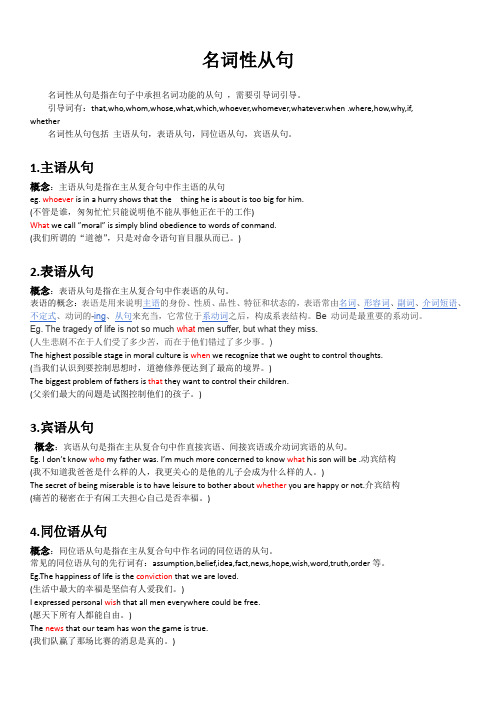
名词性从句名词性从句是指在句子中承担名词功能的从句,需要引导词引导。
引导词有:that,who,whom,whose,what,which,whoever,whomever,whatever.when .where,how,why,if, whether名词性从句包括主语从句,表语从句,同位语从句,宾语从句。
1.主语从句概念:主语从句是指在主从复合句中作主语的从句eg.whoever is in a hurry shows that the thing he is about is too big for him.(不管是谁,匆匆忙忙只能说明他不能从事他正在干的工作)What we call”moral” is simply blind obedience to words of conmand.(我们所谓的“道德”,只是对命令语句盲目服从而已。
)2.表语从句概念:表语从句是指在主从复合句中作表语的从句。
The highest possible stage in moral culture is when we recognize that we ought to control thoughts.(当我们认识到要控制思想时,道德修养便达到了最高的境界。
)The biggest problem of fathers is that they want to control their children.(父亲们最大的问题是试图控制他们的孩子。
)3.宾语从句概念:宾语从句是指在主从复合句中作直接宾语、间接宾语或介动词宾语的从句。
Eg.I don’t know who my father was. I’m much more concerned to know what his son will be .动宾结构(我不知道我爸爸是什么样的人,我更关心的是他的儿子会成为什么样的人。
)The secret of being miserable is to have leisure to bother about whether you are happy or not.介宾结构(痛苦的秘密在于有闲工夫担心自己是否幸福。
(完整版)名词性从句
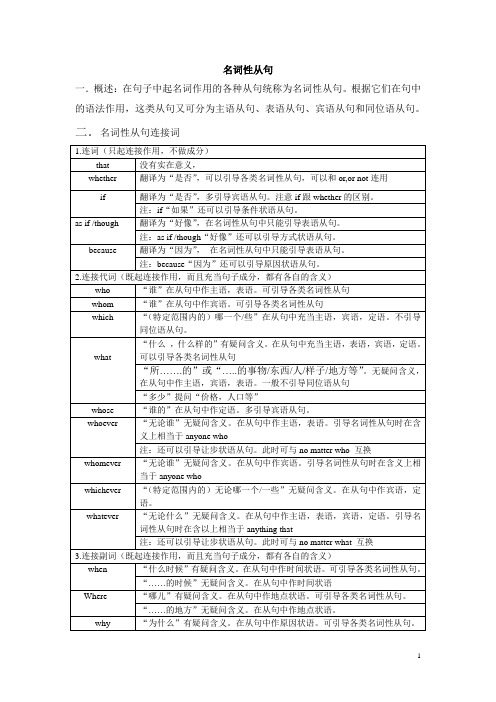
名词性从句一.概述:在句子中起名词作用的各种从句统称为名词性从句。
根据它们在句中的语法作用,这类从句又可分为主语从句、表语从句、宾语从句和同位语从句。
二.名词性从句连接词四.if, whether的区别1.引导主语从句时,如果主语从句放在句首,只能用whether不能用if引导,但是如果用it 做形式主语,而把主语从句放在句末时,也可以用if引导.2.引导宾语从句时常放在动词know, ask, care, wonder之后,if和whether均可。
少数动词,如: leave, put, discuss, doubt后的宾语从句常用whether. 。
3.在介词后面的宾语从句中,在表语从句、同位语从句中,表“是否”,只能用whether;4.whether和if都可以和or not连用,但是whether 之后可以直接跟or not,而if不可以。
I do n’t know whether or not I will stay.(只能用whether)5.在不定式前只能用whether.如:I can’t decide whether to stay. 我不能决定是否留下。
五.与“命令、要求、建议”等相关的名词性从句中通常用虚拟语气,虚拟语气的构成是“should+动词原形”或省去should,直接用动词原形。
六.名词性从句以考查引导词为主,同时考查时态,语序,与其它从句的区别以及混同虚拟语气的考查。
一.主语从句1.主语从句定义:在复合句中充当主语的句子叫做主语从句。
That he will succeed is certain.Whether wild life can be well protected is of great importance.Who will go makes no different.Which kind of food is the best is still not certain.What is needed for the space trip is careful preparation.Whoever comes is welcome.How we can help the twins will be discussed at the meeting.When they’ll start the project has not been decided yet.Where he hid the money is to be found out.Why dinosaurs died out remains a puzzle.2.主语从句引导词按照在句中是否做成分主要分为三类:连词that、whether、if 连接代词、连接副词。
名词性从句的语序
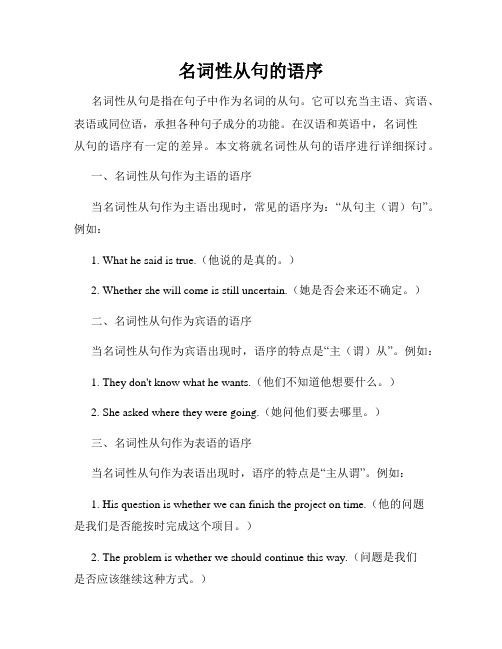
名词性从句的语序名词性从句是指在句子中作为名词的从句。
它可以充当主语、宾语、表语或同位语,承担各种句子成分的功能。
在汉语和英语中,名词性从句的语序有一定的差异。
本文将就名词性从句的语序进行详细探讨。
一、名词性从句作为主语的语序当名词性从句作为主语出现时,常见的语序为:“从句主(谓)句”。
例如:1. What he said is true.(他说的是真的。
)2. Whether she will come is still uncertain.(她是否会来还不确定。
)二、名词性从句作为宾语的语序当名词性从句作为宾语出现时,语序的特点是“主(谓)从”。
例如:1. They don't know what he wants.(他们不知道他想要什么。
)2. She asked where they were going.(她问他们要去哪里。
)三、名词性从句作为表语的语序当名词性从句作为表语出现时,语序的特点是“主从谓”。
例如:1. His question is whether we can finish the project on time.(他的问题是我们是否能按时完成这个项目。
)2. The problem is whether we should continue this way.(问题是我们是否应该继续这种方式。
)四、名词性从句作为同位语的语序当名词性从句作为同位语出现时,语序的特点是“主谓从”。
例如:1. The fact that he lied surprised everyone.(他撒谎的事实让每个人都感到惊讶。
)2. The news that she got the scholarship made her parents proud.(她获得奖学金的消息使她的父母感到骄傲。
)需要注意的是,虽然名词性从句的语序在某种程度上会受到主部分的影响,但其整体语序的一致性比较高,这也是名词性从句在句子中能够充当不同成分的原因之一。
- 1、下载文档前请自行甄别文档内容的完整性,平台不提供额外的编辑、内容补充、找答案等附加服务。
- 2、"仅部分预览"的文档,不可在线预览部分如存在完整性等问题,可反馈申请退款(可完整预览的文档不适用该条件!)。
- 3、如文档侵犯您的权益,请联系客服反馈,我们会尽快为您处理(人工客服工作时间:9:00-18:30)。
名词性从句1)what, that 引导的名词性从句的区别2)whether, if 引导的名词性从句的区别3)名词性从句与定语从句、状语从句的区别4)it作形式主语、形式宾语1. 名词性从句的内容名称例句主语从句1)What we'll do is not decided.2)It's a pity that you'll leave.3)That we are invited to a concert is good news to us.我们被邀请去参加一场音乐会,这对我们来说是个好消息。
4)Whether we'll go there upsets us.主语从句1)What we'll do is not decided.2)It's a pity that you'll leave.3)That we are invited to a concert is good news to us.我们被邀请去参加一场音乐会,这对我们来说是个好消息。
4)Whether we'll go there upsets us.宾语从句1)I don't know what we'll do.2)I know that we have been invited to a concert.3)I don't know whether we'll go there.表语从句This is what we'll do next.同位语从句1)The news that we have won the game is true.2)The problem what we'll do next upsets us.注:同位语从句前一般有fact,hope,desire,thought,suggestion,idea,news,problem,possibility等词,而从句用以补充说明该词的内容。
典例1It’s still a complete mystery _____ caused the accident.A. whatB. thatC. howD. where答案:A思路分析:句意:是什么引发了这场事故仍旧是个谜。
what 引导主语从句;it 作形式主语。
A warm thought suddently came to me _____I might use the pocket money to buy some flowers for my mother’s birthday. (that引导同位语从句,不做成分,相当于连词)典例2It has been proved ______ eating vegetables in childhood helps to protect you against serious illnesses in later life.A. ifB. becauseC. whenD. that答案:D思路分析:句意:业已证明童年时期多吃蔬菜有助于预防老年时一些重病的发生。
句中it作形式主语,其后的从句作真正的主语。
从句结构完整,故用连接词that。
典例3Tomorrow is Tom’s birthday. Have you got any idea ______ the party is t o be held?A. whatB. whichC. thatD. where答案:D思路分析:句意:明天是汤姆的生日。
你认为晚会应当在哪里举行? where引导一个同位语从句,并在同位语从句里作地点状语。
2. whether vs. if (是否)whether可用于多种名词性从句中,而if只能用于宾语从句中,所以,试题中同时出现whether和if时,选whether。
【例句】Whether the meeting will be given is still a problem. (主语从句位于句首)= The problem is whether the meeting will be given. (表语从句)= I have no idea whether the meeting will be given. (同位语从句)是否要开会仍然是个问题。
典例1_____we'll go camping tomorrow depends on the weather.答案:Whether思路分析:主语从句中只用whether。
典例2This decision will have effect on _____or not he will succeed.答案:whether思路分析:if 不与or not 连用。
考点三名词性从句中的–ever结构1. 名词性从句与状语从句中-ever的区别1)状语从句:【例句】He wouldn’t believe it, whatever I said.= He wouldn’t believe it, no matter what I said.名词性从句:【例句】He wouldn’t believe whatever I said.= He wouldn’t believe anything that I said.2)状语从句:【例句】We’ll welcome him, whoever comes here.= We’ll welcome him, no matter who comes here.名词性从句:【例句】We’ll welcome whoever comes here.= We’ll welcome anyone who comes here.(who不能省略)注:两种从句的结构及成分都不同。
2. whatever vs. whichever无限定范围时用whatever;有限定范围时用whichever。
【例句】1)I’ll do whatever I can to help you.2)We have many books, and you can take whichever you like.3. whoever vs. whomever(在从句中作宾语)【例句】1)Please give the book to whoever likes it.(whomever ╳)2)Please give the book to whomever you like.4. however 的用法1)=no matter how【例句】She leaves the window open, however cold it is.= She leaves the window open, no matter how cold it is.无论天气多么冷, 她都开着窗户。
2)表转折He likes the book. However, he has no money.典例1_____team wins on Saturday will go through to the national championships.A. No matter whatB. No matter whichC. WhateverD. Whichever答案:D思路分析:句意:在周六获胜的队都可进入全国锦标赛。
根据句子结构可知本题考查名词性从句的用法,故排除A、B两项;whatever与whichever的不同之处在于前者没有范围限定而后者有范围限定,而本句中所表达的是在本周六参加比赛的获胜队,是有范围的,故D项正确。
典例2______wants to stay in a hotel has to pay their own way.A. AnyoneB. The oneC. WhoeverD. Who答案:C思路分析:句意:任何一个想住在旅馆里的人必须支付自己的费用。
whoever在此处引导名词性从句,相当于anyone who;而anyone和the one后缺who,who表特指,故均被排除。
典例3She is very dear to us. We have been prepared to do _______it takes to save her life.A. whicheverB. howeverC. whateverD. whoever答案:C思路分析:句意:她是我们心爱的宝贝。
我们准备不惜一切代价挽救她的生命。
do后的宾语从句中takes缺宾语, whatever=anything that。
二、难点聚焦1. 宾语从句中的引导词that可以省略;(单个的及物动词后的宾语从句可省that)但and 连接两个或多个that引导的宾语从句时,第二个及其后几个从句中的that不能省略。
【例句】He says(that)he likes the book and that he’ll buy it.2. 名词性从句中不缺成分且句意完整时,用that作引导词【例句】1)Do you know(that)he has joined the army? 你知道他参军了吗?2)My suggestion is that we should go at once. 我建议我们应立刻出发。
3)That he’ll come back makes us happy. 他回来这件事让我们高兴。
3. 名词性从句中缺少主语、宾语、表语之一且指代物或事时,用what(whatever);其他引导词则根据句意来判断。
【例句】1)I can judge by what I know of him.(宾语)我可以根据我对他的了解来判断。
2)I’ll call the baby whatever name you like. 你喜欢哪个名字,我就给婴儿取那个名字。
3)This is where our problem lies. 这就是我们的问题所在。
4)Tomorrow is when it would be most convenient. 明天是最方便的时候。
4. 名词性从句vs. 定语从句(有先行词)(1)We shall not forget when(=the time when)the meeting will open.我们不会忘记开会的时间。
(2)She will give whoever(=anyone who)needs help a warm support.凡需要帮助的人,她都会给予热情的支持。
